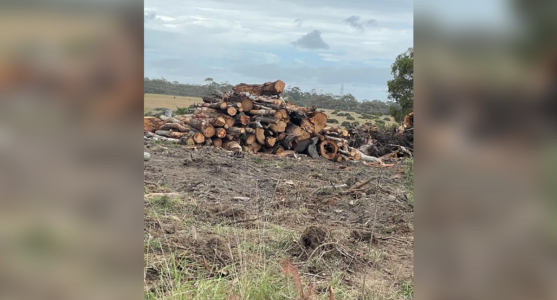You Won't Believe the Shocking Australian Issue Uncovered by a Simple Roadside Find
By
Gian T
- Replies 11
Australia is a land renowned for its unique and diverse wildlife, with creatures that are the envy of the world. However, a recent roadside discovery has cast a sad light on a devastating issue that's becoming all too common in our beautiful country: the destruction of native habitats and its heartbreaking impact on our wildlife.
The poignant image that sparked this conversation was taken by a local woman named May, who was driving home from work in the once-sleepy town of Dodges Ferry. The photograph captures a brushtail possum, looking bewildered and forlorn, perched atop a log amidst a landscape where trees once stood tall. This stark visual serves as a powerful reminder of the immediate consequences that land clearing for development can have on our native species.
Dodges Ferry, a coastal town less than a 30-minute drive from Hobart, has been transforming. What used to be a 'shack area' surrounded by lush bushland is now replaced with large modern homes and amenities to cater to the influx of people moving from the city. 'The area has changed,' May lamented, recalling the town's natural beauty and tranquil beaches now giving way to urban demands.
The change was starkly evident to May just over a week ago when she noticed a significant portion of bushland had been destroyed. Initially, she was taken aback by the number of trees that had been felled, but the possum's sight truly saddened her. 'I just felt so sad,' she said, reflecting on the vulnerable creature's plight.
This incident is not an isolated one. Across Australia, the destruction of native habitats is surging as the human population grows and expands into regional areas. While certain protections exist for wildlife already on the brink of extinction, more abundant species are often overlooked, forcing them into dangerous situations as they search for new homes.
The Sorrell Council, which governs Dodges Ferry, was approached for comment on whether the land clearing had been approved or if an environmental survey had been conducted before the bulldozers moved in. However, they were unable to respond within the requested timeframe, citing a busy schedule and a policy of responding to media queries within ten business days.
The displacement of common wildlife species such as kangaroos, possums, and wombats is a growing concern. Even insects like the Bogong moth, which once migrated across the country in the billions, are now endangered. While thriving in urban areas, the common brushtail possum has seen a 50% reduction in its range since European settlement. Evan Quartermain, head of programs at Humane Society International, points out that 'Species rarely become endangered because they're naturally scarce; it's usually because of the impact we have on them.'
Tasmania, known for its wild landscapes and as a popular tourist destination, faces its own set of challenges. The state's environment is under threat from climate change, habitat loss, and invasive species, as detailed in the long-overdue State of the Environment report. While climate change poses a significant threat, habitat destruction is an issue that can be addressed more immediately.
Quartermain argues for stronger nature laws that empower decision-makers to protect vital habitats. 'We need to be saying when there's too much wildlife present, or it's very important habitat that it can't be cleared, and we're just not doing that yet,' he emphasises.
As members of the Seniors Discount Club, we have a responsibility to advocate for the protection of our country's natural heritage. We can support organisations working to preserve habitats, participate in local conservation efforts, and use our voices to call for stronger environmental policies.
 The image of the lone possum on a log should serve as a wake-up call for all Australians. It's a stark reminder that the places we cherish and the wildlife we adore are in jeopardy. Let's not wait until it's too late to take action. Share your thoughts and experiences with us in the comments below. How can we, as a community, contribute to the preservation of Australia's precious wildlife and ecosystems?
The image of the lone possum on a log should serve as a wake-up call for all Australians. It's a stark reminder that the places we cherish and the wildlife we adore are in jeopardy. Let's not wait until it's too late to take action. Share your thoughts and experiences with us in the comments below. How can we, as a community, contribute to the preservation of Australia's precious wildlife and ecosystems?
The poignant image that sparked this conversation was taken by a local woman named May, who was driving home from work in the once-sleepy town of Dodges Ferry. The photograph captures a brushtail possum, looking bewildered and forlorn, perched atop a log amidst a landscape where trees once stood tall. This stark visual serves as a powerful reminder of the immediate consequences that land clearing for development can have on our native species.
Dodges Ferry, a coastal town less than a 30-minute drive from Hobart, has been transforming. What used to be a 'shack area' surrounded by lush bushland is now replaced with large modern homes and amenities to cater to the influx of people moving from the city. 'The area has changed,' May lamented, recalling the town's natural beauty and tranquil beaches now giving way to urban demands.
The change was starkly evident to May just over a week ago when she noticed a significant portion of bushland had been destroyed. Initially, she was taken aback by the number of trees that had been felled, but the possum's sight truly saddened her. 'I just felt so sad,' she said, reflecting on the vulnerable creature's plight.
This incident is not an isolated one. Across Australia, the destruction of native habitats is surging as the human population grows and expands into regional areas. While certain protections exist for wildlife already on the brink of extinction, more abundant species are often overlooked, forcing them into dangerous situations as they search for new homes.
The Sorrell Council, which governs Dodges Ferry, was approached for comment on whether the land clearing had been approved or if an environmental survey had been conducted before the bulldozers moved in. However, they were unable to respond within the requested timeframe, citing a busy schedule and a policy of responding to media queries within ten business days.
The displacement of common wildlife species such as kangaroos, possums, and wombats is a growing concern. Even insects like the Bogong moth, which once migrated across the country in the billions, are now endangered. While thriving in urban areas, the common brushtail possum has seen a 50% reduction in its range since European settlement. Evan Quartermain, head of programs at Humane Society International, points out that 'Species rarely become endangered because they're naturally scarce; it's usually because of the impact we have on them.'
Tasmania, known for its wild landscapes and as a popular tourist destination, faces its own set of challenges. The state's environment is under threat from climate change, habitat loss, and invasive species, as detailed in the long-overdue State of the Environment report. While climate change poses a significant threat, habitat destruction is an issue that can be addressed more immediately.
Quartermain argues for stronger nature laws that empower decision-makers to protect vital habitats. 'We need to be saying when there's too much wildlife present, or it's very important habitat that it can't be cleared, and we're just not doing that yet,' he emphasises.
As members of the Seniors Discount Club, we have a responsibility to advocate for the protection of our country's natural heritage. We can support organisations working to preserve habitats, participate in local conservation efforts, and use our voices to call for stronger environmental policies.
Key Takeaways
- A photograph has captured the distressing sight of a brushtail possum perched on a log amid felled trees, highlighting the impact of land clearing in Dodges Ferry near Hobart.
- A local resident named May expressed her sadness over the transformed area, which has seen significant development, replacing bushland and simple structures with modern homes and amenities.
- The Sorrell Council, responsible for the area, did not immediately comment on whether they had approved the land clearing or conducted an environmental survey.
- Humane Society International is concerned about the decline of common species like the brushtail possum due to habitat destruction and emphasises the need for stronger nature laws to prevent further loss.











